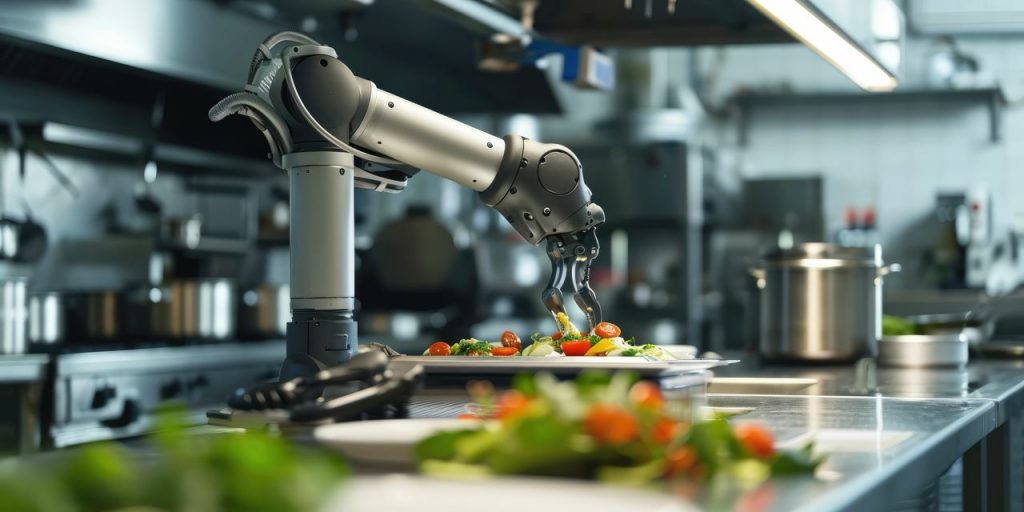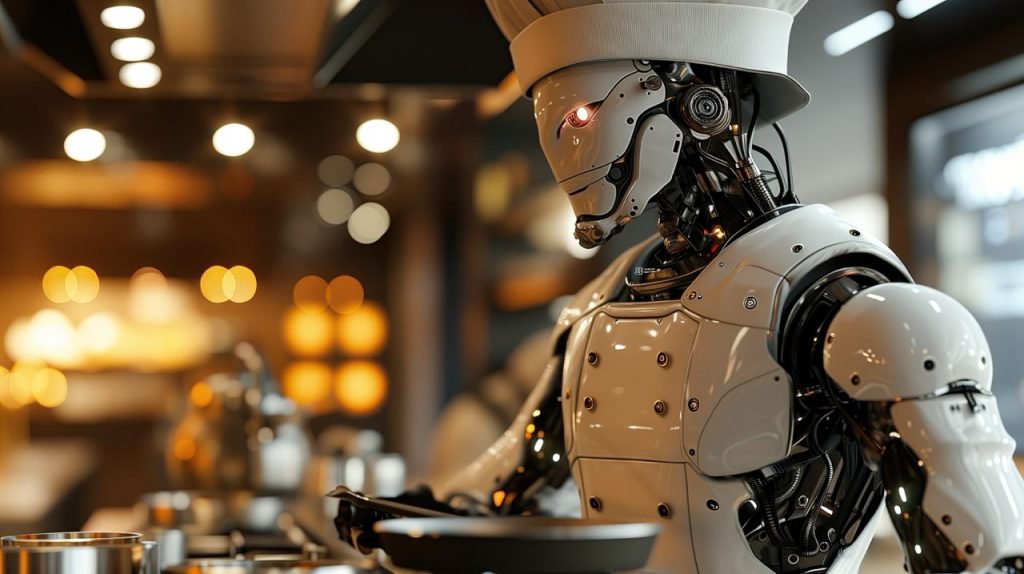The restaurant industry is embracing cutting-edge technologies to enhance customer experiences and streamline operations. One such innovation taking the industry by storm is AI-powered voice assistants. These virtual helpers are revolutionizing how we interact with restaurants, from making reservations to providing personalized recommendations.
According to a recent report, over 40% of consumers are using voice assistants for various purposes, with the number expected to rise exponentially in the coming years. As this technology becomes more ubiquitous, its impact on the restaurant industry is undeniable, reshaping the way we dine and setting new trends in customer engagement.
The Rise of Voice-Enabled Restaurant Services

The integration of voice assistants into restaurant services is a game-changer, offering unparalleled convenience and seamless interactions for both customers and businesses. Here are some of the key ways in which AI voice assistants are influencing restaurant trends:
1. Effortless Dining and Reservations
Gone are the days of being put on hold while trying to make a reservation. With voice assistants, customers can simply speak their desired reservation details, and the AI will handle the rest. An automated answering service for restaurants not only enhances the overall experience but also reduces the workload on restaurant staff, allowing them to focus on other aspects of service delivery.
2. Personalized Recommendations and Dietary Accommodations
AI voice assistants can leverage customer data and preferences to provide personalized recommendations tailored to individual tastes and dietary needs. With the ability to process natural language, these virtual assistants can understand complex dietary restrictions or food allergies, ensuring that customers receive recommendations that align with their specific requirements.
3. Enhanced Restaurant Operations
Beyond customer-facing interactions, AI voice assistants are also streamlining behind-the-scenes operations in restaurants. From inventory management to staff scheduling and even recipe analysis, these intelligent assistants can optimize various processes, leading to increased efficiency and cost savings.
The Transformative Influence of AI Voice Assistants on Restaurant Trends
While the adoption of AI voice assistants in the restaurant industry is still in its early stages, their influence is already reshaping various aspects of the dining experience and setting new trends. These intelligent virtual helpers are not just a novelty; they are driving tangible changes in customer behavior, operational strategies, and overall industry dynamics.
Redefining Customer Expectations and Experiences
AI voice assistants are revolutionizing the way customers interact with restaurants, setting new standards for convenience, personalization, and overall service quality. By offering effortless reservation capabilities and tailored recommendations, these assistants are raising the bar for customer expectations.
Consumers have become accustomed to the convenience and personalization offered by voice assistants in their daily lives, and they now expect the same level of experience from restaurants. Failing to adapt to these changing expectations could risk losing customers to competitors who have embraced this technology.
Driving Operational Efficiencies and Cost Savings
Beyond enhancing customer experiences, AI voice assistants are also influencing operational strategies within restaurants. By streamlining processes such as inventory management and staff scheduling, these assistants are enabling restaurants to optimize their operations, reduce labor costs, and improve overall efficiency.
Studies have shown that restaurants implementing AI voice assistants have experienced significant reductions in labor costs associated with front-of-house operations.
Fostering Innovation and New Business Models
The integration of AI voice assistants is not only influencing existing restaurant operations but also paving the way for entirely new business models and innovative concepts. Some restaurants are exploring the idea of “voice-only” services, where customers can make requests solely through voice commands without the need for a physical storefront or traditional menu.
Additionally, the data collected by these assistants can provide valuable insights into customer preferences and behavior, enabling restaurants to develop targeted marketing strategies, personalized loyalty programs, and even new menu offerings tailored to their customer base.
Shaping Industry Landscape and Competitive Dynamics
As AI voice assistants gain traction in the restaurant industry, they are likely to shape the industry’s landscape and competitive dynamics. Early adopters of this technology may gain a significant advantage over laggards, attracting more customers and potentially capturing a larger market share.
Moreover, the integration of AI voice assistants could also lead to collaborations and partnerships between restaurants and technology companies, further blurring the lines between the hospitality and tech industries.
In short, the influence of AI voice assistants on restaurant trends is multifaceted, touching upon various aspects of the industry, from customer experiences and operational strategies to business models and competitive dynamics.
As this technology continues to evolve and gain wider adoption, its impact is poised to become even more profound, forever changing the way we perceive and experience dining.
| Aspect | Without AI Voice Assistants | With AI Voice Assistants |
| Customer Experience | Traditional reservation methods, limited personalization | Effortless voice-based reservations, personalized recommendations |
| Operational Efficiency | Reliance on manual processes, potential for human errors | Streamlined operations, reduced labor costs, minimized errors |
| Business Models | Conventional dine-in, takeout, and delivery models | Potential for innovative voice-only services |
| Competitive Landscape | Competition based on traditional factors like location, pricing, and ambiance | Early adopters gain an advantage, potential for disruption |
| Industry Dynamics | Clear separation between hospitality and technology sectors | Blurred lines, with increased collaboration between restaurants and tech companies |
Challenges and Considerations
While the potential benefits of AI voice assistants in the restaurant industry are undeniable, there are also several challenges and considerations that must be addressed:
- Privacy and Data Security: As these assistants collect and process customer data, ensuring robust data privacy and security measures is crucial to maintaining customer trust.
- Integration and Compatibility: Seamless integration with existing restaurant systems and platforms is essential for maximizing the benefits of voice assistants.
- User Adoption: Encouraging widespread adoption among customers and staff may require education and training to overcome potential resistance to new technologies.
To address these challenges, restaurants must prioritize transparent data practices, invest in seamless integration solutions, and actively promote the advantages of AI voice assistants to their stakeholders.
Future Trends and Innovations

The integration of AI voice assistants in the restaurant industry is just the beginning. As technology continues to evolve, we can expect even more innovative applications and trends to emerge:
- Multimodal Interactions
While voice interaction is currently the primary focus, future AI assistants may incorporate multimodal interactions, combining voice with visual and gesture-based inputs for enhanced user experiences.
- Predictive Analytics and Personalization
By leveraging advanced machine learning algorithms and data analytics, AI assistants will become even more adept at predicting customer preferences and providing highly personalized recommendations, further enhancing the dining experience.
- Integration with Smart Home Ecosystems
As AI voice assistants become more prevalent in households, we may see seamless integration between these assistants and smart home ecosystems, enabling customers to make reservations directly from their connected devices.
FAQs

Q: Will AI voice assistants replace human staff in restaurants?
A: No, AI voice assistants are designed to complement and support human staff, not replace them entirely. The goal is to enhance efficiency and customer experiences, while still maintaining the human touch that is essential to the hospitality industry.
Q: How secure is the customer data collected by AI voice assistants?
A: Reputable AI voice assistant providers prioritize data security and privacy, implementing robust encryption and anonymization techniques to protect customer information. However, it’s essential for restaurants to carefully evaluate the data practices of their chosen solutions.
Q: Can AI voice assistants accommodate different languages and accents?
A: Yes, modern AI voice assistants are designed to understand and process various languages and accents, making them accessible to a diverse customer base. However, the degree of accuracy may vary depending on the specific solution and the language/accent in question.
Embrace the Future of Dining

The integration of AI voice assistants in the restaurant industry is a testament to the power of technology in enhancing customer experiences and driving operational efficiency. As this trend continues to gain momentum, restaurants that embrace these innovations will be well-positioned to stay ahead of the curve and meet the evolving expectations of their customers.
By leveraging AI voice assistants, restaurants can offer unparalleled convenience, personalized recommendations, and streamlined operations, setting new standards in the dining experience. So, the next time you visit your favorite restaurant, don’t be surprised if a friendly virtual assistant greets you and takes your request – it’s the future of dining, and it’s here to stay.



